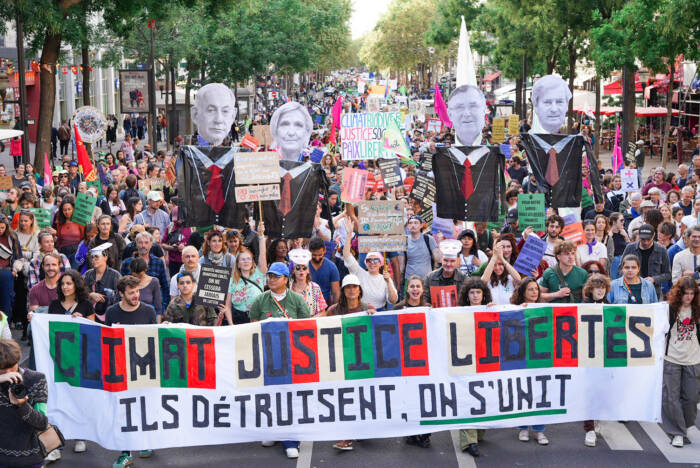Des dizaines de milliers de personnes participent aux marches “Climat, Justice, Libertés” partout en France dans le cadre de la mobilisation mondiale Draw The Line

Paris, France. Aujourd’hui, 40 000 personnes sont descendues dans les rues à Paris et dans près de 70 villes et communes françaises — notamment Nantes, Lille, Lyon, Strasbourg, Grenoble, Amiens, Montpellier, Marseille et Dijon — lors des marches Climat, Justice, Libertés. D’un grand cortège festif aux accents de carnaval au départ de la Gare du Nord à Paris à des marches aux quatre coins du pays, les manifestant·es ont uni leurs voix pour demander au gouvernement français d’arrêter de retarder l’action climatique et de réparer les crimes environnementaux coloniaux, de taxer les ultra-riches et les entreprises fossiles afin de financer les services publics et la transition énergétique, et d’imposer un embargo total sur la vente et le transfert d’armes à Israël.
Des photos et vidéos de la marche parisienne sont disponibles [ici] et des photos globales de Draw The Line sont disponibles [ici].
Cette mobilisation unique a rassemblé une coalition puissante et diversifiée de plus de 325 organisations — dont 350.org, Les Amis de la Terre France, Action Justice Climat, Greenpeace France, Alternatiba, Attac France, Ghett’up, GreenFaith France, Les Impactrices, ainsi que les principaux syndicats CGT, FSU et Solidaires. Pour la première fois, des personnes issues des communautés les plus touchées par des crises multiples et subissant des oppressions systémiques — du Brésil à la Palestine, du Congo au Vietnam, ainsi que de différents territoires français y compris ultra-marins — étaient au coeur de la mobilisation. Les manifestant·es ont dénoncé la mainmise des géants des énergies fossiles, des multinationales de l’agro-industrie, des marchands d’armes et des milliardaires qui détruisent la planète et exploitent, ainsi que la classe politique qui les protège, et ont appelé à un véritable changement de système.
Les marches Climat, Justice, Libertés s’inscrivent dans la continuité de la mobilisation citoyenne sans précédent contre la loi Duplomb ainsi que des blocages et grèves des 10 et 18 septembre qui ont donné le ton de cette rentrée. L’élan impulsé aujourd’hui n’est qu’un début. Alors que le Projet de Loi de Finances 2026 sera bien sera bientôt débattu à l’Assemblée nationale, à moins de 6 semaines de la COP30 à Belém au Brésil, et alors que la campagne des élections municipales de 2026 se rapproche à grands pas, la pression sur le gouvernement français pour adopter des mesures ambitieuses en matière de justice climatique, sociale et fiscale ne fera que croître.
Ces manifestations s’inscrivaient dans le cadre de Draw The Line, une quinzaine mondiale d’action avec plus de 600 mobilisations dans 85 pays — de Berlin à Johannesburg, de New York à Manille — exigeant la fin des énergies fossiles, une taxation des grandes fortunes et une transition juste à l’approche de la COP30.
Fanny Petitbon, Responsable de l’équipe France chez 350.org, a déclaré :
« Ce qui s’est passé aujourd’hui à Paris et partout en France démontre que les gens refusent de baisser les bras. Le message envoyé au président Macron et au futur gouvernement Lecornu ne pourrait pas être plus clair : arrêtez de traîner les pieds en matière d’action climatique et d’entraîner l’UE dans votre sillage, arrêtez de saboter nos services publics et de contraindre les personnes les plus précaires à payer le prix fort de votre cure d’austérité injuste. Le choix est simple : enfin écouter les Français·es et instaurer une taxe sur les grandes fortunes pour accélérer la transition écologique et financer les écoles et les hôpitaux, ou protéger coûte que coûte les intérêts des ultra-riches et des pollueurs. Nous avons tracé notre ligne rouge — et nous exigerons des comptes. »
Soraya Fettih, Chargée de campagne senior France chez 350.org, a déclaré :
« La mobilisation d’aujourd’hui a montré la force de la solidarité entre les luttes. Les mouvements antiracistes, décoloniaux et de solidarité avec la Palestine, marchant aux côtés des syndicats, des militant·es pour le climat et des organisations engagées pour la justice sociale, ont envoyé un message clair : il n’y a pas de justice climatique sans droits humains. Nous traçons la ligne contre le génocide, l’exploitation et la violence systémique — à Gaza et partout dans le monde. La cupidité des industries fossiles et de l’armement alimente à la fois la guerre et le chaos climatique, et mettre fin à l’ère des énergies fossiles est indissociable de la fin des oppressions. Ensemble, nous exigeons un monde plus juste et plus sûr, où chacun·e peut s’épanouir. »
###
Notes aux rédactions
- Des photos et vidéos de la marche parisienne sont disponibles [ici] et des photos globales de Draw The Line sont disponibles [ici].
- Plus d’informations : www.climat-justice-libertes.fr
- Le dossier de presse des Marches Climat Justice Libertés est disponible ici.
Contacts presse
- Fanny Petitbon (350.org), +33 6 19 12 21 46, [email protected]
- Mark Raven (350.org), +44 7841 474125, [email protected]